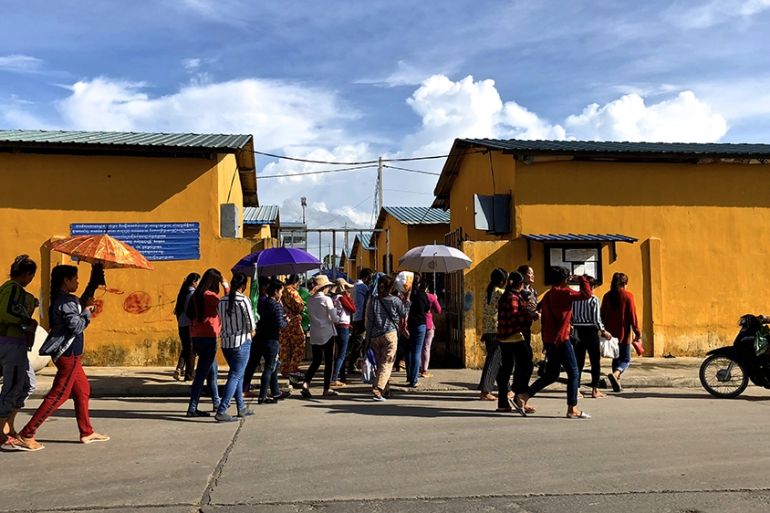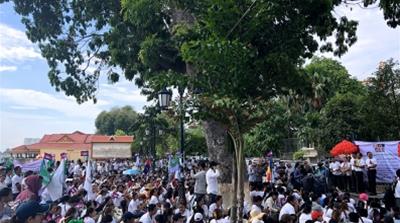Cambodia-European Union trade deal is on the chopping block
Accusations of human rights abuse by the Cambodian government may force the end of a preferential trade agreement.

Two sisters sit on the tile floor of a small bare room. There is no furniture other than a short, waist-high dish drying rack. In place of mattresses, there is only a pile of blankets. One sister chops vegetables while the other sits behind her, stroking her hair.
Despite being garment workers, neither sister has ever heard of Cambodia’s Everything But Arms (EBA) deal with the European Union.
Keep reading
list of 4 items‘We need you’: Solomon Islands’ support for US agency’s return revealed
Why are nations racing to buy weapons?
Parallel economy: How Russia is defying the West’s boycott
“The company never said anything about that. During meetings, they just ask us to work quickly and with good quality,” one sister says.
The EBA is a preferential trade deal that allows Cambodia to export goods other than weapons to the EU tariff and duty-free. The agreement is in jeopardy because the EU is accusing the Cambodian government of violating human rights. The EU condemned the 2017 arrest of opposition leader Kem Sokha and the dissolution of his party – the Cambodia National Rescue Party (CNRP). Kem is accused of planning to topple the government.

The sisters say they only keep enough money to buy food and pay rent; they send the rest of their earnings to family in the provinces. If they lost their jobs, they worry, they will have to migrate to another country for work, possibly exposing themselves to higher risks and abuse.
They have little control, however, over what happens next. Losing the EBA would principally affect the garment industry, which employs roughly 800,000 Cambodians. Mass layoffs are expected if the EBA falls through.
The EU’s six-month investigatory period into Cambodia’s alleged human rights abuses began in February and ended in August. Many observers expected the prime minister to strike a conciliatory tone and offer concessions to preserve the agreement. Instead, he accused the EU of trying to hold Cambodia “hostage”.
Replacing EBA?
Prime Minister Hun Sen claims to be unconcerned about the possible loss of EBA, asserting that China will help mitigate any economic losses. He also says bilateral trade with European countries can replace the deal.
But Fei Xue, an analyst with The Economist Intelligence Unit, says it would be “difficult” for the country to make up EBA-related losses.
“Cambodian merchandise exports to the EU stood at $4.2bn in 2018, while exports to China amounted to only $983m,” he said in a recent email to Al Jazeera.
Moreover, EU countries are not allowed to strike their own trade deals outside the bloc. And even if they could, according to Xue, it would not be the same.
“The EU’s EBA scheme grants tariff-free access to some 99 percent of Cambodia’s exports to the single market. It is unlikely that bilateral deals could achieve the same depth of coverage,” Xue said.
He noted that the US is considering cancelling a similar deal with Cambodia, and the US-China trade war will only further strain relations with Cambodia.
“The escalation in the US-China trade war since 2018 contributed to the rise in Cambodian exports to the US, some of which are likely transshipments from China circumventing the tariffs on Chinese goods,” he explained. “Coupled with US concerns over increasing economic and military ties between Cambodia and China, this will certainly affect the US evaluation of Cambodia’s trade benefits.”
Escalating tensions
While members of Cambodia’s business community are trying to prevent the withdrawal of the country’s EBA status, political groups point to reasons the trade deal could soon end.
The Garment Manufacturers Association of Cambodia (GMAC), appealed to the EU for clemency.

“[A] suspension of EBA benefits for our sector will result in large job losses across the garment, footwear and travel goods labour force and would not serve the EBA programme objective of poverty eradication and sustainable development,” read an August 12 statement from the GMAC.
Miguel Chanco, a senior Asia economist at Pantheon Macroeconomics, said a downturn in the garment sector would be “damning”. And while Chinese investment in infrastructure might soften the blow, Chanco believes Beijing’s economic influence will not likely “absorb the surplus labour”, which he warns could cause a “jump in unemployment”.
Meanwhile, in a recent statement, the CNRP condemned the government’s continued “political oppression and persecution”.
In April, CNRP member Tith Rorn died in prison under suspicious circumstances. The next month, more than 140 CNRP members and supporters were summoned for questioning over allegedly continuing party activity. In July, activist Kong Raiya was arrested during a public demonstration.
“In terms of protection of human rights, very, very little has been done,” said CNRP vice president Mu Sochua in a recent interview.
She also said the prime minister is biding his time – and may wait until the last minute to offer dramatic concessions like the release of Kem Sokha – but will never consent to true reform.
“He wants to abuse human rights as long as he can,” she said.
The EU must make its final decision in February 2020.
The prime minister frequently complains that the international community holds Cambodia to a higher standard while other countries enjoy positive relations with the EU despite committing similar rights violations.
Chanco said questioning this discrepancy is fair. “I suspect that Cambodia was a ‘less costly’ example to make for other countries in the region, given its economy’s far smaller size,” he said.
Cambodia also may be held to a higher standard because the international community has expended a great deal of time and money trying to encourage democratic reforms in the Southeast Asian nation.
Astrid Noren-Nilsson, a political scientist who specialises in Cambodia, said the EU “gambled” on economic pressure, but with limited success.
“Economic sanctions tend not to be effective, but in this case there was a sense that the situation was volatile enough that the threat thereof might be,” she said in an email to Al Jazeera. “The best outcome that the EU could ever hope for was minor concessions, but even those prospects now look faint.”
Of particular concern to the government will be the garment industry’s propensity for demonstrations. Mass protests gripped Cambodia in 2013-14, led by the CNRP and garment workers.
Pang Sineng, who has worked in a Cambodian garment factory for more than 10 years, said she hopes the EBA gets revoked. An open supporter of the CNRP, her brother, was arrested during the 2013-14 protests.
“We talk about the EBA a lot and are very concerned about our income and quality of life. But we also hope it can bring some change,” she said.